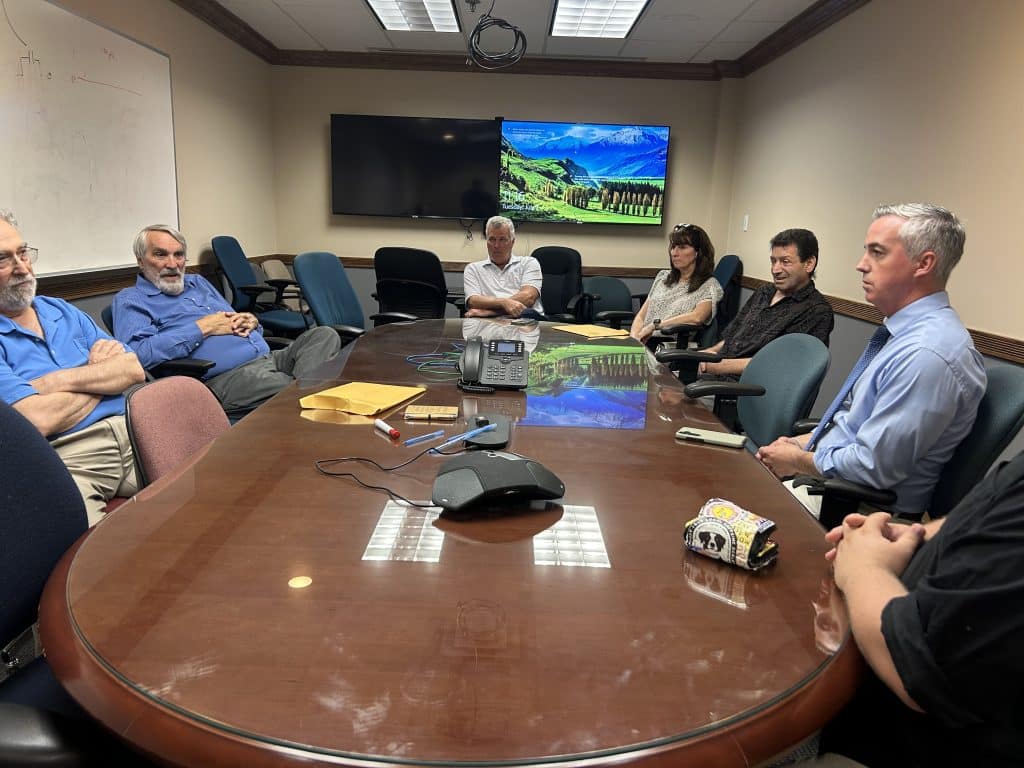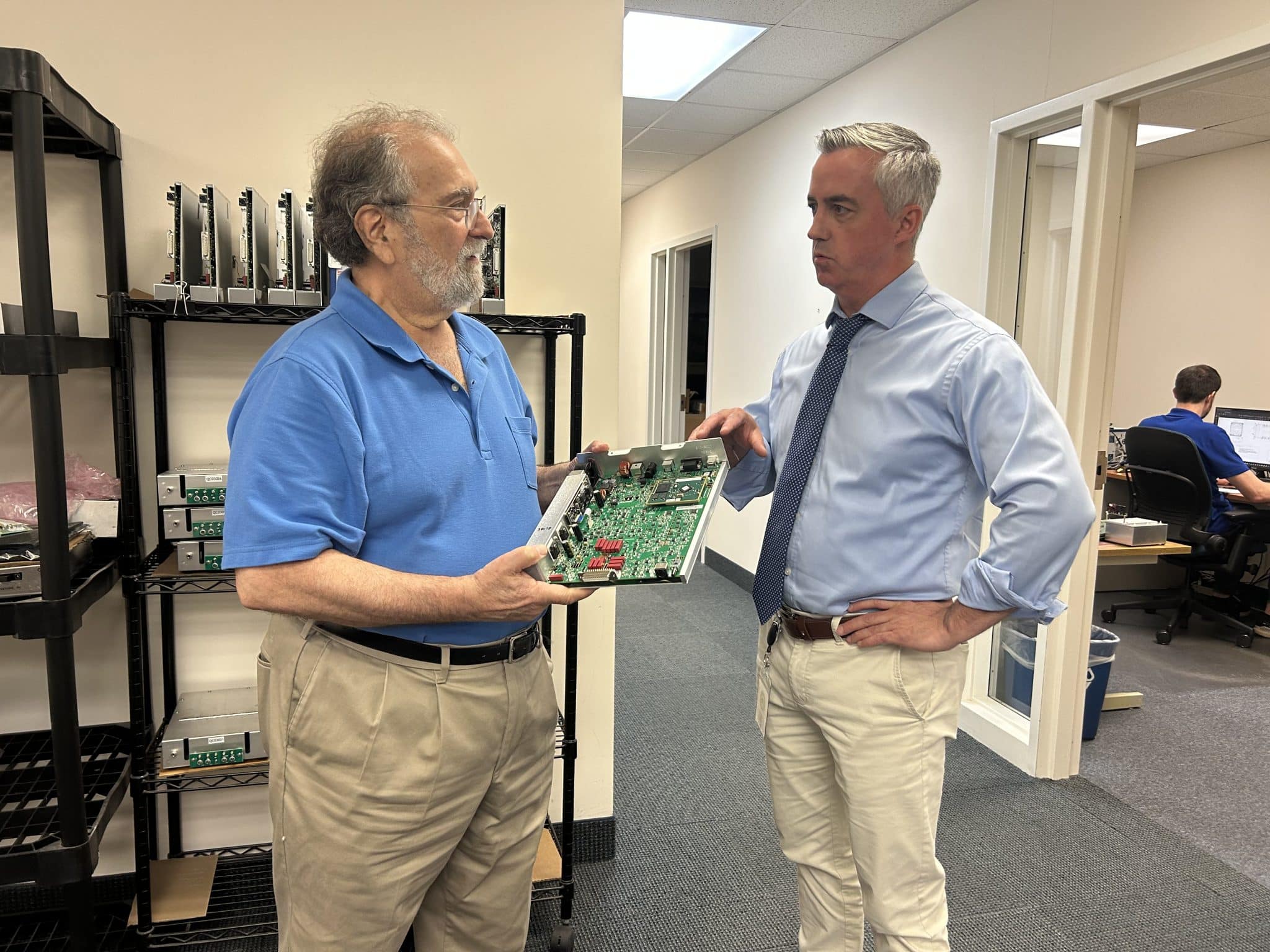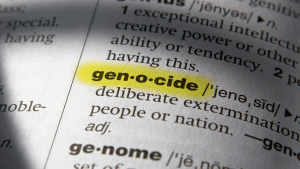A Bucks County electrochemical instrument manufacturing business is collateral damage in Trump’s tariff wars.
Max Yaffe, co-founder and vice president of Gamry Instruments, took Bucks County Commissioner Bob Harvie and local reporters on a tour around the company’s Warminster Headquarters last week. In Warminster, in addition to manufacturing this company with global operations conducts sales, marketing, accounting and development work locally.
In April this year, Yaffe penned an open letter to Rep. Brian Fitzpatrick published in the Bucks County Herald detailing the congressman’s visit in 2018 where he “made a great show of encouraging local manufacturing,” but asking if Fitzpatrick still believes in this amidst Trump’s retaliatory tariffs.
“You said you were pro-U.S. manufacturing. Are you still? Will you come see what you have put at risk?” Yaffe asks in the letter.
Analysis by the JPMorganChase Institute found that U.S. employers earning between $10 million to $1 billion in annual revenue stand to lose $82.3 billion as a result of Trump’s tariffs and that this “could potentially be managed through price hikes, layoffs, hiring freezes or lower profit margins.”
One issue critics raise with the tariffs is that Trump declared an “economic emergency” in order to bypass Congress and impose the taxes unilaterally – questioning the legality.
Harvie, who is running to unseat Republican Rep. Fitzpatrick, told the Bucks County Beacon he believes that precise tariffs can be utilized at certain times to protect American workers and American interests, but businesses rely on stability.
“Donald Trump’s chaotic economic policies, especially around tariffs, make economic landscapes unstable, which is bad for our businesses,” he said.
Gamry sells products to glucose sensor developers to optimize their sensors for people with diabetes to the Naval Research Lab in D.C. and Florida where their equipment is used to test corrosion properties of the hulls of ships and for medical implants that need to be tested for corrosion.
Since 2018, after several invites back from Yaffe, Fitzpatrick did not return; rather, he sent an aide once since the initial visit.
Gamry Instruments, which employs about 65 people with offices in China, Italy and the U.S., has significantly exported to China, along with Europe, Canada, South America, Africa, and the Middle East. In the previous year, Yaffe estimated about 40% of the company’s market was in the U.S., 30% in China and 30% in the rest of the world. Yaffe also estimated that the company sells 60% of products to universities internationally.
The company also imports parts for their products. The parts for their products come from all over the world. Yaffe estimated their printed circuit boards to have 2,000 components, of which about 30-40% are sourced from China. They also import shipping boxes.
“Over and over, you’re going to see a lot of different subcontractors getting hit by this,” Yaffe said.

On June 4, Trump’s 25% import tax on all steel and aluminum entering the U.S. was doubled to 50%. A week later Trump announced that China will face 55% tariffs, while U.S. goods entering China will only take a 10% hit. However, on April 9 the tariff rate on China’s exports was 145% – illustrating the volatility and unpredictability of Trump’s tariff strategy.
Chris Beasley, Gamry director of sales and marketing, said Gamrey would likely lose business to foreign competition because of the tariffs.
“Gamry’s gone in China temporarily, and that’s 23-25% of our business. Gone overnight because of those tariffs,” Beasley said. “So you can imagine customers who really want Gamry but can’t pay the import tariff [customers] just go to Europe and [buy from] European competitors. And the longer that that drags on, the harder it is for us to get that market back.”
Not only are the tariffs high value disconcerting, Beasley said drastic fluctuations could negatively affect business.
“You can’t plan for anything, or you start a plan, then suddenly the tariffs are off, so you cancel that plan, but then they’re back on,” Beasley said.
Jacob Ketter, an instrumentation chemist at the company, added that because Gamry largely sells to researchers at universities, the Trump administration’s research funding cuts are also harming the company’s business.
The order and fulfillment process has been disrupted, resulting in lost revenue.
Yaffe said he could set up his company’s manufacturing in Italy where they have an office. The cost of doing this is uncertain, but Yaffe is nonetheless exploring the option. However, this would harm the company’s vendors and thus the country at large.
“The guys who make our panels and our cases–they don’t have to be in the U.S. The guys who make our boxes–they don’t have to be in the U.S,” Yaffe said. “Instead of having a 25% tariff going into China from the U.S., we might have an 8% tariff going in from Europe into China. The U.S. is going to get screwed.”
Harvie responded to the possibility of Gamry relocating their manufacturing.
“Obviously, we want you to stay… from Philadelphia all the way to New Jersey in terms of all the businesses, this is a scientific kind of alleyway,” Harvie said. “I know you’re fitting in there in terms of sciences, biosciences, and everything that attracts people here and makes this a great place to live.”
READ: Tariffs Can Be Useful — But Not How Trump Is Using Them
Yaffe underscored how the U.S. as a whole could be harmed by Trump’s tariffs.
“This is not a progressive question; if anything, it’s a capitalist question,” Yaffe said. “There is a market. We have competitors all around the world, and they don’t have to suffer through this.”
One Gamry employee is concerned about the current political partisan animosity.
“I don’t disagree with you,” Harvie said. “But since I came into office [as a Bucks County Commissioner] five and a half years ago, over 90% of the votes we’ve taken have been unanimous. It’s easy to do the right thing when you’re just doing it for the right reasons. As Governor Shapiro said, we get stuff done, because if we don’t, then people suffer.”
Gamry Instruments is inherently a part-international business. Ketter said this international group is who the company sells to, it’s who listens to the company and who goes to their website to receive training and information. Yaffe shares the sentiment.
“It’s an international community of researchers that we serve, all out of this dinky little place in Bucks County,” Yaffe said. “[We’re] a microcosm of what’s happening in 100,000 companies in the U.S. We thrive in a free market … the closer we can come to an open society and a free market, the better we’re going to do.”







